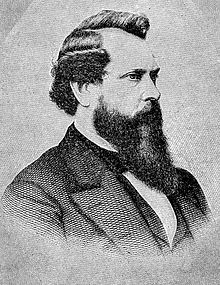| Thomas A. Jenckes | |
|---|---|
 | |
| Member of the U.S. House of Representatives from Rhode Island's 1st district | |
| In office March 4, 1863 – March 3, 1871 | |
| Preceded by | William Paine Sheffield, Sr. |
| Succeeded by | Benjamin T. Eames |
| Member of the Rhode Island House of Representatives | |
| In office 1854–1857 | |
| Personal details | |
| Born | (1818-11-02)November 2, 1818 Cumberland, Rhode Island |
| Died | November 4, 1875(1875-11-04) (aged 57) Cumberland, Rhode Island |
| Resting place | Swan Point Cemetery |
| Political party | Republican |
| Alma mater | Brown University |
| Occupation | Lawyer |
| Signature |  |
Thomas Allen Jenckes I (November 2, 1818 – November 4, 1875) was a United States representative from Rhode Island. Jenckes was best known for introducing a bill that created the United States Department of Justice. President Ulysses S. Grant then signed the bill into law on June 22, 1870. Jenckes was also a supporter of civil service reform.
Biography
Thomas Jenckes was born in Cumberland, Rhode Island on November 2, 1818. He graduated from Brown University in 1838. Jenckes was admitted to the Rhode Island state bar in 1840. He was clerk in the Rhode Island state legislature from 1840 until 1844. From 1854 until 1857 he was a member of the State house of representatives. He was elected as Republican to the United States Congress in 1863 and served until 1871 when he lost a bid for reelection. He then resumed the practice of law in Cumberland.
U.S. House of Representatives
Jenckes was first elected to the U.S. House in 1863, defeating Democratic opponent Charles J. Bradley by seventeen percentage points. He was subsequently re-elected three times by landslide margins.
During his House tenure, Jenckes was mostly known for introducing legislation which created the United States Department of Justice. Contrary to some narratives that suggest this was an effort to bolster Reconstruction policies during the presidency of Ulysses S. Grant and safeguard the constitutional rights of blacks, it was primarily for the purpose of professionalizing legal practice. Indeed, Jenckes "paid little attention" to protecting Southern blacks.
Considered a "reformer," Jenckes was an early advocate of civil service reform and known as "the father of civil service." When he introduced legislation pushing it, fierce opposition was met by Radical Republican colleague John A. Logan of Illinois, who was concerned with the plight of Southern blacks and called the bill "probably unconstitutional." The enactment of a civil service system to replace the traditional spoils system would prevent Republicans from utilizing patronage to benefit blacks, and it was later implemented via the Pendleton Civil Service Reform Act years after Jenckes left office.
Having prosecuted fraud implicated in the Credit Mobilier scandal, Jenckes' tenure was also marked by his revisions of bankruptcy law and involvement in cases related to Goodyear rubber, the Corliss steam engine, in addition to patents pertaining to refrigeration and ventilation.
In the 1870 United States House of Representatives elections, Jenckes was defeated by fellow Republican Benjamin T. Eames.
Death
Jenckes died in Cumberland, Rhode Island on November 4, 1875, and is interred at Swan Point Cemetery in Providence.
References
- ^ Johnson, Rossiter; Brown, John Howard, eds. (1904). The Twentieth Century Biographical Dictionary of Notable Americans. Vol. VI. Boston: The Biographical Society. Retrieved April 28, 2022 – via Internet Archive.
- RI - Eastern District Race - Apr 01, 1863. Our Campaigns. Retrieved February 12, 2022.
- Candidate - Thomas A. Jenckes. Our Campaigns. Retrieved February 12, 2022.
- April 6, 1865. The Rhode Island Election. The New York Times. Archived version available here. Retrieved February 12, 2022.
- ^ Shugerman, Jed H. (March 21, 2013). The Creation of the Department of Justice: Professionalization Without Civil Rights or Civil Service. The University of Texas at Austin School of Law. Retrieved February 12, 2022.
- Freilach, Jennifer (April 6, 2017). When Was the Department of Justice Established? History News Network. Retrieved February 12, 2022.
- ^ Thomas A. Jenckes Papers: A Finding Aid to the Collection in the Library of Congress. Library of Congress. Retrieved February 12, 2022.
- Jones, John Pickett (1982). John A. Logan: Stalwart Republican from Illinois, p. 21. Google Books. Retrieved February 12, 2022.
- John A. Logan: Stalwart Republican from Illinois, p. 34
- Matthews, Dylan (July 20, 2016). Donald Trump and Chris Christie are reportedly planning to purge the civil service. Vox. Retrieved February 12, 2022.
- RI - Eastern District Race - Nov 08, 1870. Our Campaigns. Retrieved February 12, 2022.
- Spencer, Thomas E. (1998). Where They're Buried: A Directory Containing More Than Twenty Thousand Names of Notable Persons Buried in American Cemeteries, with Listings of Many Prominent People who Were Cremated. Genealogical Publishing Com. p. 296. ISBN 9780806348230.
Further reading
- Ari Hoogenboom, "Thomas A. Jenckes and Civil Service Reform," Mississippi Valley Historical Review, vol. 47, no. 4 (March 1961), pp. 636–658. In JSTOR
External links
- United States Congress. "Thomas Jenckes (id: J000076)". Biographical Directory of the United States Congress.
| U.S. House of Representatives | ||
|---|---|---|
| Preceded byWilliam Paine Sheffield, Sr. | Member of the U.S. House of Representatives from Rhode Island's 1st congressional district 1863-1871 |
Succeeded byBenjamin T. Eames |
- 1818 births
- 1875 deaths
- Brown University alumni
- People from Cumberland, Rhode Island
- Politicians from Providence County, Rhode Island
- Civil service reform in the United States
- Half-Breeds (Republican Party)
- Burials at Swan Point Cemetery
- Republican Party members of the United States House of Representatives from Rhode Island
- Republican Party members of the Rhode Island House of Representatives
- 19th-century members of the United States House of Representatives
- 19th-century members of the Rhode Island General Assembly